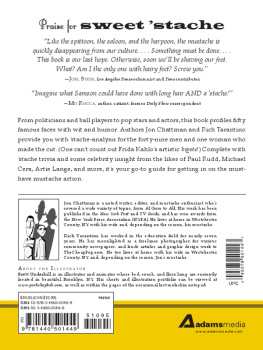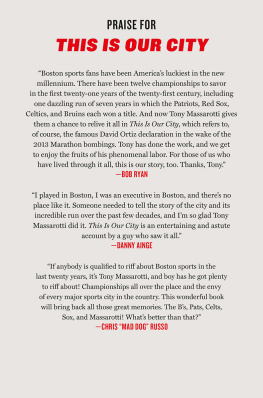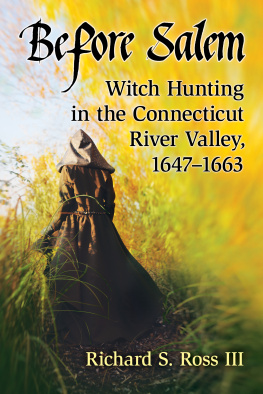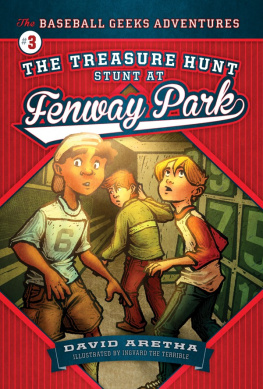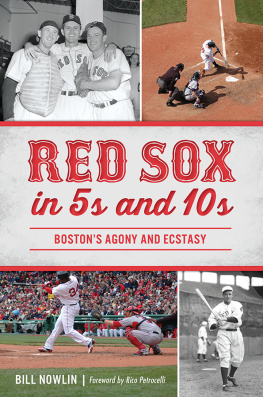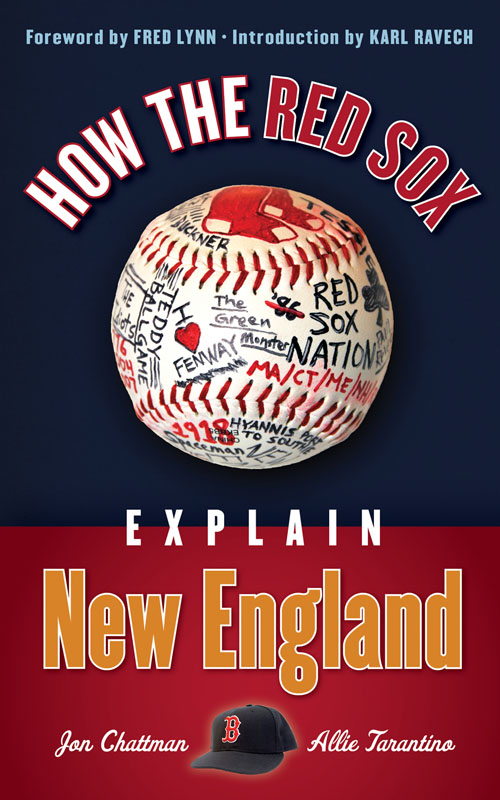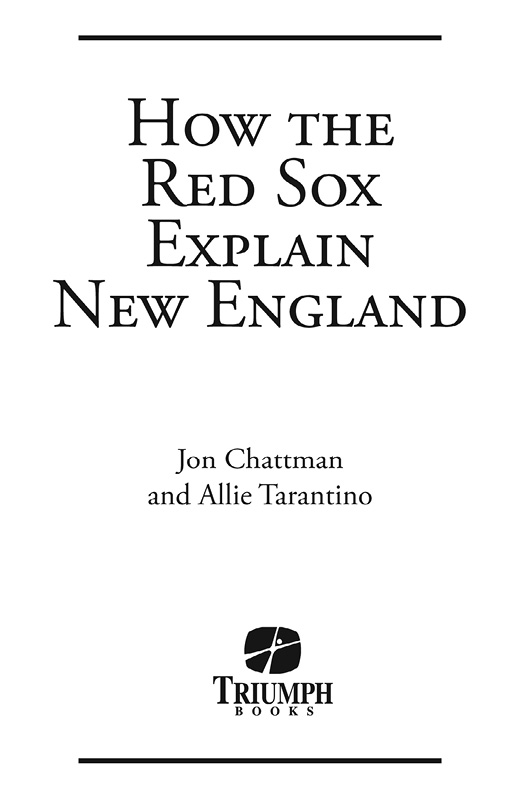
Jon Chattman dedicates this book to his parents, Gary and Patti; his wife, Alison; and his son, Noah.
Allie Tarantino dedicates this book to his parents, Ralph and Diane; his wife, Shira; and his children, Cyrus and Juniper.
Contents
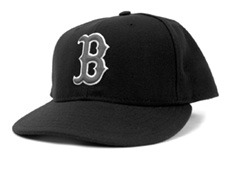
Foreword by Fred Lynn
Baseball is such a familiar game. Its played almost every day, and most people have played it at one time in their lives. Theres a connection there. In New England people just get caught up in it. And I mean all of New England. The best way I can put it isits a way of life. Wherever you go as a player in Boston, the fans recognize you, they want to be with you and want to be a part of it all.
There will be people in Maine eating lobster on the back porch on a sunny afternoon in late August, and theyll be listening to the Red Sox. Its an event there, and its all encompassing. Its just 24/7. As a player, you can never get away from it. I would go fishing to decompress mentally. Players need that. On the West Coast, there are a billion other things to do. Its not as fervent. People are not as rabid about their team as New Englanders. Youd go to the park, and youd see the people coming in, and it was apparent to me pretty quickly that people knew what they were talking about. If a player on another team had a great game, they applauded. Now, they didnt want him to win, but they respected his performance. You could tell they were knowledgeable. The fans came early, and they stayed late. I used to love that. You dont notice those things as much until you go someplace else, and you miss that electricity.
Part of it is the allure of Fenway Park and the people who played there. I felt it. I was in the same outfield where Ted Williams and Mickey Mantle played. Great players were there before me, and it was really cool. The fans know that stuff. The atmosphere there is like no other. When the team is doing well, its great. And when theyre not, the fans will let you know it, and thats okay, because were professionals. They dont want you to lose, and neither do we. In Boston you do really learn about yourself when youre not doing well or when your team is not doing well. But you have to stand up and answer the questions. When you go to the park, you better be ready mentally.
Im kind of the shy and introverted type. When I signed with Boston, I heard about the people and the media. I was just told to Listen to the questions they ask you, and answer them. Dont volunteer anything else. That was great advice, and I wasnt a quotable guy. We had plenty of guys on the team who loved to talk and all those kinds of things. It gets a lot easier as time goes on, and I had some preparation. My background was for big-stage things, and I had a pretty good pedigree. Im really a West Coast guy with roots in the Midwest. I was born in Chicago, but when I was two years old, my family moved us out West. We were a blue-collar family with a middle-class upbringing. I walked to school each day, even though the bus went right by our house. I was shy growing up except when it came to athletics. I wasnt a forceful guy when I played. I just played the game and adapted to all the other things that came with it as I went along.
So I wasnt some naive kid. I had played ball in college and played international baseball for three years, representing the United States each time. The international ball was as much media as you could get at that time. So I had a pretty solid base athletically and media-wise. Because of my background in college, I was a high draft pick. I didnt sign right away in June 1973. I played another year internationally for the U.S. All-Stars against Japan. The Red Sox said to finish that out, and my pro career started in mid-July of that year. I started in Double A in Bristol, Connecticut, where ESPN is now located. I was there only a month and a half, when I was called up to the Triple A World Series, which we won. I played four months in Pawtucket, Rhode Island, before I was called up and got a taste of the majors in September 1974. Since I did pretty well down there, I wasnt in the minors for a long time. Ive always been pretty good at seizing the moment, especially when its young guys playing against older guys who sort of discount you. Thats the worst.
The Giants were my favorite team growing up, and here I was, with Orlando Cepeda and Juan Marichal as my teammates, sitting and talking with them on the bench. I felt totally comfortable on the fielda little awkward off the field. What helped the next year was that we had a core group of young players. We were all going through the same thing. Jimmy Rice and I were there. Dwight Evans was there at that point, and Pudge (Carlton Fisk) was only 26 or 27. We were all young and we all hung out. The focus wasnt just on me, so there really was no pressure. And we were pretty bad up until that point, so nobody expected anything of me or the team. We didnt know what we had, and nobody expected rookies to do anything. There was never any mention of an MVP or Rookie of the Year. We were just trying to win for the first time since 1967. It was fun, and Jimmy and I got into the middle of the lineup quickly. I feel badly for Miguel Cabrera, whos been playing for a while, and now its all about the Triple Crown, and Mike Trout and his rookie year. The media is just all over the place now. I dont know if I wouldve handled it as well in todays game. Its hard to say.
In 1975 we werent getting national attention as a teamnot until mid-June when I drove in 10 runs and hit three homers. All of the sudden, people were like, Who is this guy? The people on the West Coast knew, but we werent on TV, so nobody else did. We had a few nationally televised Game of the Wee k s , and I made some good plays. I helped put This Week in Baseball on the map. The team was playing really well, I was playing really well, and questions started being asked. Can the Red Sox do it? Can they pass the Yankees? And, no one mentioned curses back thenit was probably because no team had gotten close.
But at least we were in the fight. After the 1978 playoff loss to the Yankees, that mightve started the seed for The Curse. And it was in its full-blown glory in 1986. But we didnt have to worry about that kind of thing. Our group of guys in the 70s helped put the Red Sox on the map nationally, and thats when this kind of thing evolved. But it was never about me. It was about the team. If I was playing now, I probably wouldve gotten endorsements mid-season that year. I would have an agent fielding offers for this and that, but I didnt even have an agent back then!
When I left the Red Sox, it wasnt under the best of circumstances. Unfortunately, it happened to a number of players under the old regime. When youre traded away, you want to do well against your old team. The fans were pissed off they got rid of us, but at the same time, you become the enemy right away. Im pretty good at leaving things behind that are out of my control. You have to put the blinders on, the ear plugs in, and just go on. Thats why some guys who come from small markets fail in New York or Boston. They cant handle the pressure and the press. Instead of three guys in the locker room after a game, its 50, and theyre asking, How come your sinker isnt sinking? Some guys handle it; some cant. I always kind of looked forward to facing the Red Sox. But in the 1986 playoffs, I pulled for them. When you play in the American League, you pull for the league. I hate to see teams lose when I think they should win, and 1986 was hard.


